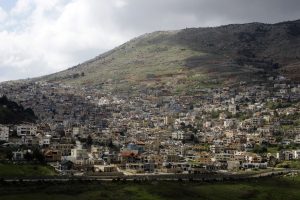Syrian president says Israel security talks may yield deal soon
By JNS STAFF
(JNS.org) – Syrian President Ahmed al-Sharaa said on Wednesday that ongoing security negotiations with Israel may soon yield a formal agreement.

A shot of the Golan Heights taken in 2019 showing Israel’s territory seized from Syria in the Six-Day War of 1967 and later annexed in a move never recognised by the international community. (Photo by Louai Beshara /AFP via Getty Images)
During a briefing before his trip to the United Nations General Assembly in New York, the Syrian leader said talks could lead to results “in the coming days,” according to Reuters.
He added that the security pact was a “necessity” for regional stability, specifying that any agreement must respect Syrian airspace, uphold the country’s territorial integrity and be monitored by the United Nations.
Israeli Strategic Affairs Minister Ron Dermer met with Syrian Foreign Minister Asaad al-Shaibani and U.S. ambassador to Turkey and special envoy for Syria Tom Barrack in London on Wednesday to discuss security arrangements for a third round of U.S.-mediated negotiations, according to Axios.
Progress was made towards an agreement during the five-hour talks in the British capital, the American news site reported, citing a source familiar with the negotiations. The Syrian side presented its response to the Israeli proposal for a security deal between Jerusalem and Damascus, according to the report.
Reuters reported on Tuesday that Washington was applying pressure on Syria to reach an agreement before world leaders gather next week in New York for the General Debate of the 80th Session of the U.N. General Assembly. However, al-Shara denied on Wednesday that Washington was pressuring Syria, saying it was playing the role of mediator.
For its part, Syria wants to end Israeli strikes and for IDF troops to withdraw from Syrian territory. Jerusalem took over strategic sites, including Mount Hermon, after the fall of the Assad regime in December 2024, and public statements have indicated that the military intends to remain at these posts to maintain security.
Al-Shara acknowledged that Israel wants to remain at these strategic sites and said that Damascus wanted a deal similar to the 1974 Disengagement of Forces Agreement that ended the Yom Kippur War, which established a demilitarized zone between the two countries.
With regard to the future of the Israeli Golan Heights, which U.S. President Donald Trump officially recognized as sovereign Israeli territory during his first term, al-Sharaa said it was too early to discuss because it was a “big deal.” Jerusalem has remained steadfastly against giving up control of the Golan Heights.
Al-Sharaa also said that Damascus and Jerusalem had been only “four or five days” from reaching an understanding on a security arrangement but that an outbreak of violence in the southern province of Sweida had derailed that. According to reports from rights groups and local Druze activists, armed clashes in July between regime-allied forces, Druze militias and Sunni Bedouin tribes escalated into widespread violence targeting civilians. Israel stepped in militarily to protect the Druze minority and is planning further assistance for the Druze.
“Reconciliation begins with a single step. In Suwayda, this map charts not just a process of healing, but a path future generations of Syrians can walk as they build a nation of equal rights and shared obligations for all,” Barrack wrote on X Wednesday, retweeting a Tuesday statement from the Jordanian Foreign Ministry on a recent meeting held with Syria and the United States continuing a joint roadmap to resolve the crisis in Sweida Province.
U.S. Secretary of State Marco Rubio on Thursday then reposted Barrack’s X post, writing that Trump’s “vision of peace through strength continues to guide our policy in the Middle East. Encouraged to see progress on the Suwayda roadmap, which seeks to advance accountability, reconciliation, justice for victims of atrocities, and minority rights in Syria.”


